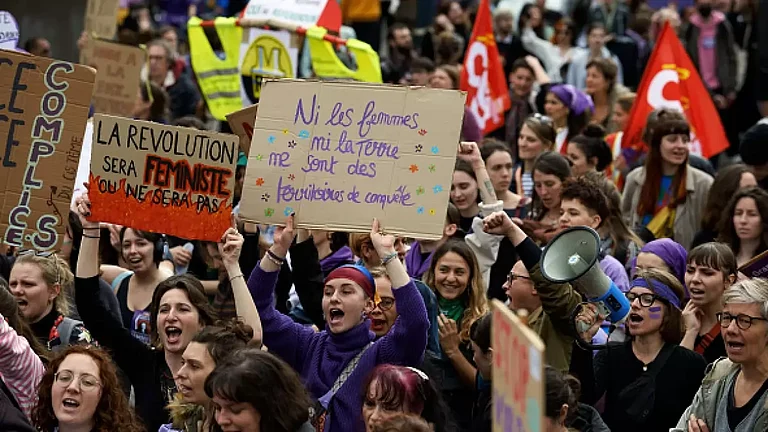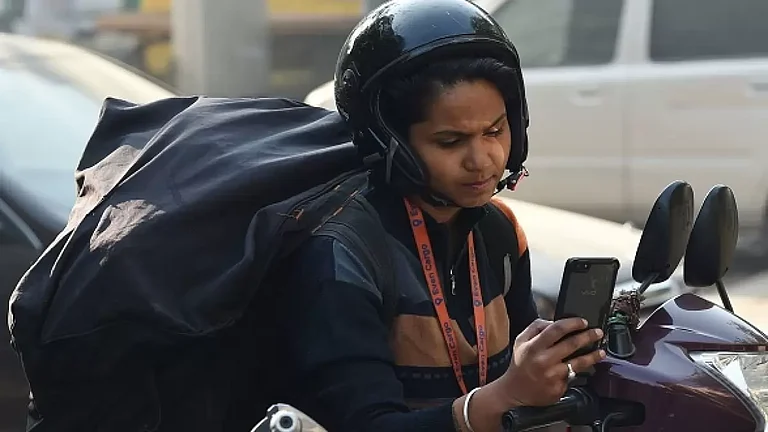That is how the female cabin crew of a famous airline in India introduce themselves during the in-cabin announcements prior to take off, whereas the male pilots are described as ‘aviators’. What if the male pilot is a father and has a house? Are they introduced in a similar way?
How Sexism Is Prevalent Even At 30,000 Ft Above Ground
Even within the cabin, women crew members are often at the receiving end of rude passengers and their ire

The airline IndiGo started making this ‘special announcement’ in the cabin from the year 2022. Their goal was to challenge traditional stereotypes and shine a light on the multifaceted roles that women excel in, both within and outside the aviation sector, the airline said in a statement to Outlook. However, gender activists and female passengers alike have been caught by surprise over the announcement.
“Aren't they showing impossible standards for women by adding so many roles and then try to blanket it by saying born leaders?” asks Meghna Mehra, a gender rights activist.
Rutvika Charegaonkar was travelling to Delhi in an IndiGo flight recently when she noticed the announcement. Recalling her interaction with the crew members, she wrote on social media, “I asked the crew members later, she embarrassingly said that yes, that’s our new script. As we also take care of the home we have to call ourselves homemakers. I tried to ask them, all men working with Indigo must also be dads and having a home, do you also say that for them?”
While the airlines claims that the rationale behind this announcement is to underscore the “skill set and professionalism” their cabin crew brings to their role and to highlight that their “capabilities extend well beyond their immediate duties”, some say it has a sexist undertone.
“There is nothing wrong with being a homemaker but how many times do we see similar announcements or even statements for men?” asks Mehra. When men work in the workplace, they are professionals but when women do, they are often reminded that they are also mothers, sisters, homemakers, she adds, “while men are rarely reminded that they are fathers, brothers and sons.”
Sexism in the aviation industry
The aviation industry in the country has had a history of sexism and gender discrimination. Although data collated by the International Society of Women Airline Pilots shows that India has the highest proportion of female commercial pilots in the world at 12 per cent – twice as high as in most Western countries and way above the global average of 5 per cent, many face sexism on a daily basis.
In one such instance, Air India in 2021, was accused of actively discriminating against pregnant women pilots, by taking them off of all flight duties and shifting them to desk jobs. “The airline’s actions are insulting to [women pilots] and almost makes out pregnancy as if it is a stigma or a negative marker which makes the said woman pilot ‘unfit’ or ‘not qualified or entitled’ to discharge her duties ably, shoulder to shoulder with her male counterparts,” a letter by the Indian Commercial Pilots’ Association read, Hindustan Times reported.
Some companies had recruitment policies that were criticised for being sexist. In one such bizarre policy, budget carrier GoAir had told The Times of India in 2013 that it would be hiring predominantly female flight attendants in future because they are 15-20 kilos lighter on average than men. In fact, Air India had once sacked air hostesses for being ‘overweight’, according to a report by BBC.
Even within the cabin, women crew members are often at the receiving end of rude passengers and their ire. In December 2022, a video showing a heated exchange between an IndiGo crew member and a passenger went viral on social media. The crew member is heard saying, “I am an employee, I am not your servant” in response to a customer’s rude behaviour. Rallying behind her, the CEO of Jet Airways, Sanjiv Kapoor, said in a post, “Crew members are human too.” While there was no publicly reported information on what happened after this exchange, netizens online hoped that the airline company stands by the crew.
Over the last few years, airlines have been introducing some policies that prioritise recruitment of female pilots and making the work environment more gender-sensitive. The Directorate General of Civil Aviation last year urged all its employees to use gender-inclusive language in all official communication – for example, use words like “flight attendants/cabin crew” and “workforce” instead of air hostesses and manpower, respectively.
IndiGo says it provides day care facilities and offers office duties for pregnant women and an allowance equivalent to what they would have earned flying, helping them “constructively stay engaged with the profession.” In the company, 43 per cent of its workforce and almost a fourth of its leadership are women, the airline said in the statement. While the move to recognise their efforts through a special announcement seems encouraging and empowering, it is still reinforcing patriarchal notions, says Mehra.






















